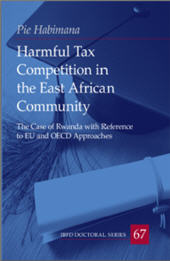2023 - IBFD Publishing
E-book
Digital Version
Download | Copy/paste | Printing
Harmful tax competition in the East African Community : the case of Rwanda with reference to EU and OECD approaches
xi, 305 p.
- Includes bibliographical references (p. 290-305).
- This book discusses harmful tax competition in the East African Community (EAC) with reference to EU and OECD approaches. With a focus on Rwanda, the book examines whether Rwanda's tax competition practices are within the parameters of internationally accepted practices. In this context, the book identifies Rwanda's favourable tax measures and assesses each from the perspective of EAC law, complemented by the EU and OECD standards on harmful tax competition. Given the dearth of legal studies on harmful tax competition in the EAC, this book is the first to address harmful tax competition in depth in an academic context. Thus, it not only sheds light on the current state of harmful tax competition regulation in the EAC but also lays a foundation that can be used for further research on harmful tax competition in the EAC, as well as for the restructuring of harmful tax competition policies at the national and regional levels.
- This book also shows the possibility and extent of the application of EU and OECD standards by jurisdictions outside the European Union and OECD, in particular developing countries, to build tax systems that are free from harmful tax competition and to fill the gap in developing countries that do not have sufficient legal foundations to curb harmful tax competition. However, this book also shows that EU and OECD standards are not sufficient to eradicate all harmful tax practices, both in developed and developing countries.
- This book also warns EAC Partner States that they can be listed or delisted at any time by the OECD or the EU Code of Conduct Group, which can also have economic and political consequences. Developing countries are also advised to be mindful of the implications of multilateral solutions and the differences in interests between developed countries (capital exporters/residence jurisdictions) and developing countries (capital importers/source jurisdictions) in matters of international taxation. This book is of value to academics, tax policymakers, politicians, tax practitioners and non-governmental organizations, as well as to anyone interested in the topic of harmful tax competition, especially from the perspective of developing countries. [Publisher's text]
-
Information
ISBN: 9789087228101
SERIES
DISCIPLINES


